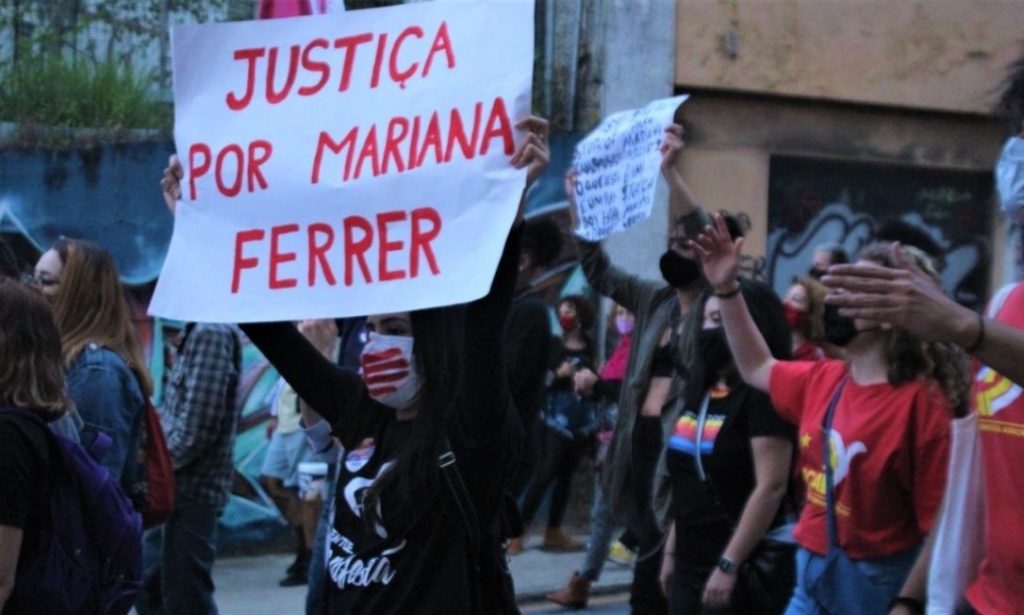
Trigger warning: graphic descriptions of rape
Mari Ferrer was once known as the Brazilian Kylie Jenner. A lifestyle and beauty influencer from Southern Brazil, she had landed a gig in a beach club in Florianópolis in late 2018—as a “social ambassador,” her job was to post about the club, the food, music, and attend parties with her guests. Not long after she was hired, Mari was drugged, taken to a secluded location, and raped by André Camargo de Aranha, one of the bar’s associates.
The case first gained attention when the story was shared on a Twitter thread in Portuguese in January of 2019 (read the thread in English here). It includes heartbreaking footage from the night of the rape, including text messages Mariana sends to friends she was with, begging for them to come pick her up. Their responses are nonchalant: “our dinner just got here,” “we’ll talk tomorrow.” She also calls her mother, sobbing, asking for her father, and saying, “nobody is really your friend.” According to the thread, after getting home, clearly out of it, her mother takes her to the hospital, where the infamous ‘rape kit’ is collected. She is injured and bleeding, and the rapist’s semen is found in her underwear.
Armed with evidence, Mariana goes to court, not once, but twice. The first time, her rapist is considered innocent because “there was no intent to rape.” Video footage from the Zoom trial goes viral, and in it, the defense lawyer, Cláudio Gastão, is seen verbally harassing the victim: “don’t come at me with these crocodile tears,” thank God I don’t have a daughter like you, and I ask God that my son doesn’t find a woman like you.” Among the evidence used by the defense are sensual pictures of Mariana, some edited to make her look more ‘vulgar.’
The trial footage garnered attention from the entire country, from celebrities to Brazilian former president Fernando Collor. A petition asking Gastão to be held accountable gathered over 4 million signatures. UN Women Brazil also released a statement in support of Mariana and against sexual violence against women. The National Justice Council opened an investigation on Gastão’s behavior. This is a repeated offense for him—Sandra Bronzina became a survivor at 13, and at 29, she shared her experience being harassed by Gastão when her rapist was on trial. Damares Alves, the Minister of Women and Human Rights, in a radio interview, condemned the defense lawyer’s behavior and stated that this type of behavior from the courts “is not normal.”
Mariana appealed. The newest decision, released in October of 2021, is that her rapist is, once again, innocent. According to the courts, there was a “lack of evidence” to support her claims that she had been raped.
Since she was raped, Mariana has dedicated her life to looking for justice. Her social media accounts have turned into a journal of her struggle, where she shares details from the shambles her life has become. She begs audiences to share her case with the public and receives a lot of support from sympathetic voices. However, there is also significant backlash. From the start, she has been painted as a liar, not only by her rapist, but also countless others who care to weigh in on the situation online. She routinely receives hate comments and death threats. Needless to say, her life and mental health have been destroyed.
Mariana plans on appealing again. On the meantime, the Brazilian Chamber of Deputies approved, in March of 2021, the “Mari Ferrer Law,” which protects sexual violence victims from harassment in legal trials. This is not the first time a law was created using the name of a survivor who did not receive justice—the Maria da Penha law was named after one of the most prominent names among domestic violence advocates in Brazil, a woman who survived two murder attempts from her ex-husband in the late 1990s. After years of legal procedures, he was also considered innocent by the courts, and walks free today.
When it comes to violence against women in Brazil, as well as many other countries, this is normal. The normal is for victims to be treated like defendants if they ever get as far as standing in front of a judge. Mariana is white, and wealthy enough to afford the legal services necessary to be where she is today, which is not good place to begin with. If she were poor, Black, and living in a favela, we would probably not know her name. She would be one more among the thousands, millions of faceless women who survived sexual violence in Brazil, and will never see any justice.
I write this story with a broken heart and shaky hands. How can we rely on a system that is not meant to protect us in the first place? A system that consistently privileges and protects abusers, rapists, criminals? All the weapons in this world are turned against us, so how can we live in it? I don’t know, but we still do. Mariana has tried everything, been shut down in the harshest ways, but she is still alive. Sometimes, like Mariana, the best women can do is survive and hope for the best. Hope for a day in which justice is not the exception, but the rule. While that doesn’t happen, we rely on each other—we hold each other’s hands, wipe each other’s tears, and take every victory as a glimmer of hope. Mariana hasn’t won yet, but I hope, at the very least, that she can find peace.
(By Beatriz Silva De Almeida Barros)
(Beatriz Silva De Almeida Barros is a Brazilian feminist activist, currently based in the United States)
(Photo Credit: Catarinas / Viviane Rocha)